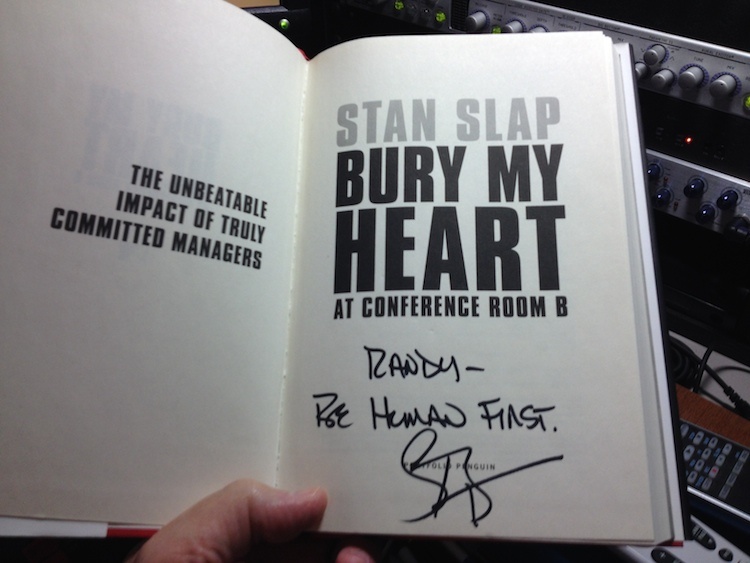Podcast: Play in new window | Download (Duration: 5:56 — 5.9MB)
Today’s audio is 5:56 minutes long.

Family. Integrity.
In 2010 I got a book in the mail. Out of the blue. It was a book by somebody I’d never heard of. Stan Slap. The title of the book was, Bury My Heart In Conference Room B: The Unbeatable Impact of Truly Committed Managers.
I knew I’d like the book before I ever made it to chapter 1. The very first page talks about the personal values that an overwhelming number of managers in every position in every country reported as being most important to them. Number one, family. Number two, integrity.
The personal values that those same managers reported as being the most under pressure to compromise in order to do their jobs successfully…number one, family. Number two, integrity.
Then, before you even get to the introduction, Stan writes, “A Manager’s Dream” where he lists 5 things that serve as today’s coaching session. In his research, Stan found out that most managers want to serve and build their companies and they want to win. None of them wants success completely defined on their company’s terms. They’d like to have a say in having success on their terms, too.
1. I want to live my most important personal beliefs at work.
I want to take with me to work the best of what my life gives me. I want enough personal energy left at the end of the day so the rest of my life isn’t just a work-release program.
2. I want respect.
I want to be in a position to be depended on and I want the job of manager to be appreciated as being part art and part science. I want to be paid to think, not merely to comply. I want to be trusted.
3. I want control.
I want authority that matches my accountability. I want a job that’s interesting and challenging but not regularly an interesting challenge to survive. I want to know that I’m creating a dependable sanctuary with my hard work. And I want to know that the harder I work the more sanctuary I’ll create. I want to trust.
4. I want impact.
I want my work to mean something to somebody. I want my work to make a difference in the world. A positive difference. I want my work to have lasting value, something that won’t be immediately forgotten in the rush to get to the next urgent priority. I want a legacy.
I want affiliation. I want to be in a healthy relationship, not one where I’m constantly begging for love and forgiveness. I want a real connection with people I spend so much time with and I want time to help my own people realize who they can be, not just what they can do.
I want to know I’m contributing to a company that can be counted on to do the right thing. I want a job that rewards my faith.
5. I want a reason to believe.
Makes you want to read the book, doesn’t it? Well, you should.
But you know the problem with books, seminars and coaching, don’t you? It’s words. Words on a page. Words delivered from a stage. Words delivered right to your face (or in the case of these sessions, right to your ears and eyes). Words are powerful, but they don’t do anything unless a person embraces them and takes action because of them.
That’s why workers are often frustrated when the boss goes away to a 3-day seminar or conference and returns with some new ideas. Most of the time, they know if they just grit their teeth and bear it, things will resume back to normal in no time. They’ve seen this all before. The boss goes away, gets all stoked about some new ideas, comes back to shake things up…but nothing ever changes!
And there’s the reason why so few people make an improvement. Armed with new information, it’s just easier to keep doing what we’ve always done. For most of us, it requires something dramatic to shake us up. I’m hopeful that you’d like to improve things, not because they’re necessarily broken, but because they can always be better!
As you ponder the list of these 5 things Mr. Slap (how’s that for a name?) mentions, keep in mind that these things likely apply to all the people who report to you, too. Whether we’re in leadership positions or not, we want these things at work. Let that knowledge guide your communication and interaction with your team and you’ll be better for it. So will your organization.